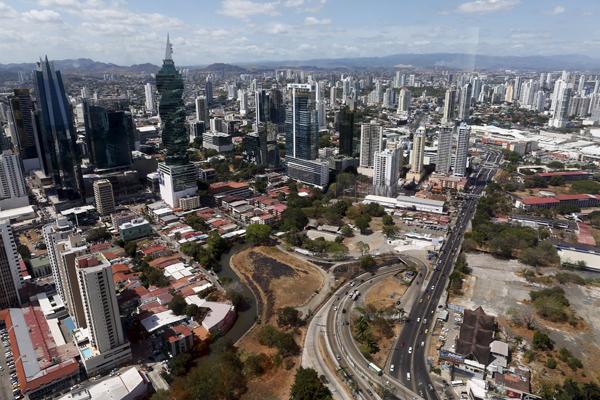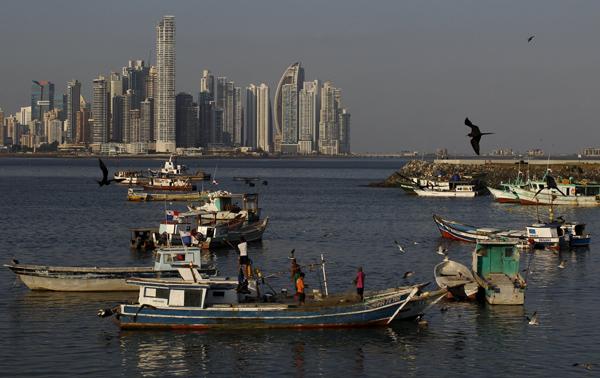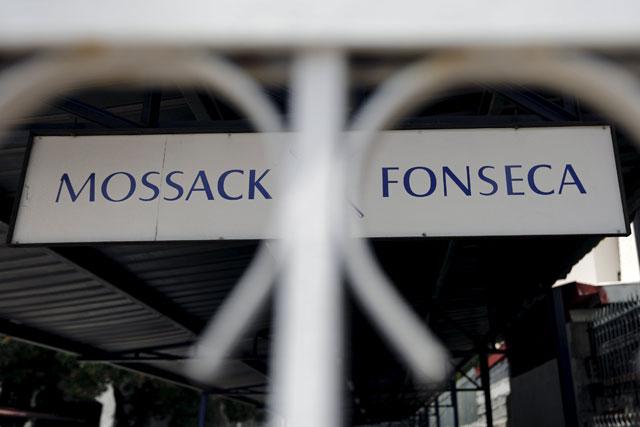You are here
Europe's banks under scrutiny as regulators look into Panama Papers
By Agencies - Apr 07,2016 - Last updated at Apr 07,2016

A general view of Panama City, is seen in this photo taken on Wednesday (Reuters photo)
BERN/GENEVA — Banking watchdogs across Europe have begun checking whether lenders have ties to a massive document leak from Panama that showed how offshore companies are used to stash clients' wealth.
Switzerland's financial watchdog FINMA said on Thursday that banks must clamp down on money laundering, as the Geneva prosecutor opened a criminal probe.
Four decades of documents from Panamanian law firm Mossack Fonseca, which specialises in setting up offshore companies and has offices in Zurich and Geneva, showed widespread use of those instruments by global banks and triggered investigations across the world.
"Do I think we are where we should be in fighting misuse in the financial system? No," FINMA Chief Executive Mark Branson told Reuters following its annual news conference.
"We think in some ways the risks in Switzerland have risen, not fallen, and that there is more that can be done. We don't want to see large scandals involving Swiss banks," he said.
Switzerland is the world's biggest international wealth management centre with around $2.5 trillion in assets and has taken on more wealth of late from emerging markets, from which it is harder to determine the origin of assets, Branson indicated.
Britain's Financial Conduct Authority said on Thursday it has written to 20 banks and other financial firms, giving them until April 15 to spell out any involvement they have with the "Panama Papers".
HSBC, Britain's biggest bank and its affiliates created more than 2,300 shell companies with Mossack Fonseca, according to the International Consortium of Investigative Journalists (ICIJ). HSBC has dismissed suggestions it used offshore structures to help clients cheat on their taxes.
Also on Thursday, France's ACPR financial regulator said it has told French banks to hand over extra information about their business ties with tax havens.
German regulator BaFin is likewise probing the role of Germany's banks, a source told Reuters on Monday.
Watchdogs in Sweden, Netherlands and Austria said earlier this week that they were looking into banks named in the papers.
The chief executive of Austria's Hypo Landesbank Vorarlberg became one of the first top bankers to quit over reports based on the data leak on Thursday, though he denies his bank violated any laws or sanctions.
Swiss banks
The "Panama Papers" investigation has exposed financial arrangements of public figures including friends of Russian President Vladimir Putin, relatives of the prime ministers of Britain, Iceland and Pakistan, and the president of Ukraine.
Branches of Swiss lenders including UBS and Credit Suisse were mentioned in the leaked documents as being among the main banks that requested offshore companies for clients. Both banks have denied wrongdoing in connection with the practice.
Swiss financial institutions, a focal point of efforts by European governments to crack down on tax avoidance, trailed only Hong Kong in having used Mossack Fonseca, the reports have said.
Branson said FINMA would first check for signs of illegal activity before deciding whether to launch an investigation linked to the Panama Papers.
There were a few indications that they may be relevant in Switzerland, Branson added.
Geneva's prosecutor also said on Thursday he had launched a criminal inquiry in connection with leaks that revealed many offshore companies set up by lawyers, and institutions in the Swiss lakeside city and financial centre.
"Some information has been made public this week and the prosecutor's office wanted to verify if this information showed anything that was against the law," a spokesman for the prosecutor said.
One prominent Geneva lawyer helped set up 136 Panama offshore companies, Swiss television has reported.
"Yes, it is an industry with a legal dimension. I have been in this business for 30 years and this activity was sought after by foreign nationals. There is nothing illegal, illicit or perception of criminality to it," another Geneva lawyer, Francois Canonica, said on Swiss television on Wednesday night.
Canonica, a former head of the Geneva bar association, referred to a period after the 1981 election of French President Francois Mitterrand, which he said drove French fearful of nationalisation to place their money in offshore Swiss accounts.
Credit Suisse Chief Executive Officer Tidjane Thiam said on Tuesday his bank was after only lawful assets.
UBS said on Monday it conducted its business in full compliance with applicable law and regulations and that it had no interest in funds that are not taxed or derived from unlawful activities.
Branson said a number of Swiss banks were implicated in a corruption scandal surrounding Brazil's Petrobras and suspicious cash flows linked to the Malaysian sovereign fund 1MDB.
FINMA has launched four enforcement proceedings against institutions in the 1MDB case and three over Petrobras.
Branson said: "There are concrete indications that the measures those banks had in place to combat money laundering were inadequate."
Separately, Panama is fighting off a feared international crackdown on its pivotal finance sector, calling for talks to calm a worldwide storm sparked by revelations of its role in a mass of secretive offshore dealings.
The small Central American nation launched the fierce rearguard action after a huge leak of 11.5 million documents from Panamanian law firm Mossack Fonseca, the so-called Panama Papers, exposed the confidential dealings of world leaders, celebrities and sports stars.
The revelations have toppled Iceland's prime minister, led to a Swiss police raid on the headquarters of European football body UEFA, and prompted media allegations against the inner circles of both the Russian and Chinese presidents.
Faced by accusations that Panama has allowed the rich and powerful to hide their funds from international tax authorities and the law, President Juan Carlos Varela vowed to "confront whoever comes to put down Panama's image".
"I call on the countries of the Organisation for Economic Cooperation and Development to return to the table for dialogue and seek agreements, and to not use these events to affect Panama's image," said Varela, whose country depends on the finance sector for 7 per cent of its economic output.
'Unfair and discriminatory'
There was no immediate reaction to Varela's comment from the Paris-based, 34-nation Organisation for Economic Coooperation and Development (OECD), which helps to coordinate the global fight against tax evasion.
Panama has already warned it could retaliate against France if it makes good on a promise to put the country back on France's blacklist of "tax havens" — a status that would cause transactions in Panama to be viewed as likely tax-dodging gambits.
The Panama government has also written a complaint to the head of the OECD, Angel Gurria, attacking a statement he made describing Panama as "the last major holdout that continues to allow funds to be hidden offshore from tax and law enforcement authorities".
Those accusations were false, "unfair and discriminatory" Deputy Foreign Minister Luis Miguel Hincapie wrote in the letter which was obtained by AFP.
The embattled world of football was the latest victim of the leaked papers, which were obtained from an anonymous source by German daily Sueddeutsche Zeitung and then shared with more than 100 media groups through the ICIJ.
Related Articles
GENEVA — Swiss police raided the headquarters of European football body UEFA on Wednesday following the latest revelations of a web of Panam
PANAMA CITY — Argentine President Mauricio Macri became the latest world leader caught in the storm of the so-called Panama Papers Thursday
LONDON/PANAMA CITY — Governments across the world began investigating possible financial wrongdoing by the rich and powerful on Monday after


















